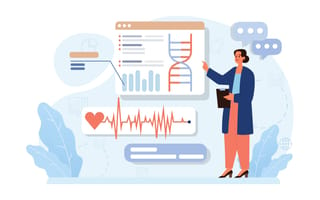Healthtech is one of the fastest growing industries in America and with good reason. Advances in technology and data science are enabling innovative new solutions to age-old problems. Healthtech companies are developing life-saving vaccines and medications, revolutionizing surgical procedures and creating new ways of interacting with healthcare providers.
The healthcare industry in the United States is constantly evolving, working to address challenges in expense and accessibility. The U.S. Department of Health and Human Services estimates that about one in 10 Americans do not have health insurance, which makes accessing providers and care far more difficult.
Industry outsiders often have misperceptions about data science work in the healthtech industry, Pedro Jofre Lora, vice president of data at Garner Health, told Built In NYC. While many people assume that data science in healthtech is only about optimizing costs, Garner’s focus is different. “The majority of the data science work that we do at Garner has very little, if anything, to do with healthcare costs directly. We’re most interested in measuring how, why and to whom healthcare is delivered,” he said.
Data science at Garner is guided by the question, “Would you send your grandma there?” This framework keeps everyone focused on the people-centric mission of doing what’s best for the patient.
This kind of data science work, leveraged to make healthcare a better patient and provider experience, is one reason the industry is growing so quickly.

Garner Health uses data science to steer its clients’ employees to the best-performing doctors.
What are some of the unique challenges to working in data science in healthtech, and what skills are important to have for a data scientist if they are considering a career in healthtech?
The largest, most unique challenge is bridging the gap between the data and the real world. The healthcare industry is an immense machine with millions of individual contributors, all of whom have unique training and perspectives that affect the way that data is recorded.
Knowing how all of these players affect the data and how to make clinical sense of the data is a good chunk of the battle in our industry. This is particularly true because the data landscape is always evolving.
New code sets are released and new guidelines are issued regularly. In addition, healthcare is practiced differently across the United States. Nurse practitioners can practice independently in some states and not others, for instance, and some states have health insurance marketplaces while others do not.
All this requires data scientists to quickly ramp up on a wealth of knowledge necessary to understand the data they’re working with and to continue to stay up-to-date. Not surprisingly, I think that the most important skills are the ability to synthesize the connections, think in systems and be curious.
What are some of the most rewarding aspects of working in data science for a healthtech company? How does your work impact the end user?
At Garner, our dataset includes about 80% of the medical claims nationwide for the last eight years. That means we have the responsibility of working with a very personal dataset that can be daunting and fraught with concern.
We’re able to overcome this on our team because we have a clear, ethical framework by which we make our decisions: do what is best for the patient. I think that’s my favorite aspect of working in data science at Garner — everything we do connects back to that framework.
In fact, we have a catchphrase: “Would you send your grandma there?” This instantly snaps us back to the framework in cases where we might have disagreements. The catchphrase serves not only to guide our decision-making in tough moments but also as an amazing reminder that what we're doing matters in a very visceral way.
The choices we make will alter the course of treatment our members — including our coworkers and our families — will get when they most need help. This framework is the glue that binds our team together and pushes us to discover ways we can improve healthcare for everyone.
What misconceptions do you think industry outsiders might have about working in healthtech?
My experience is that most industry outsiders, particularly other data scientists, believe that data science in healthtech is uniquely about optimizing healthcare costs. The truth couldn't be further from that assumption.
The majority of the data science work that we do at Garner has very little, if anything, to do with healthcare costs directly. We’re most interested in measuring how, why and to whom healthcare is delivered.
With the help of clinical researchers, our aim is to codify and illuminate the circumstances where care is appropriate and predict the likelihood of bad outcomes. An immense amount of our work is also based on ensuring that we’re being fair to the clinicians who are helping people in their communities.
An immense amount of our work is also based on ensuring that we’re being fair to the clinicians who are helping people in their communities.”
Ultimately, we’re building the systems that make it easy for individuals to find the best personalized care, and help clinicians make better, more informed choices. What we’re doing reduces healthcare costs by reducing medical waste and bad outcomes, but we’re taking a patient-centric approach that optimizes for great health outcomes.










